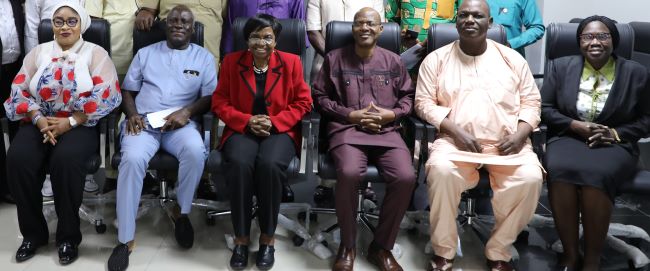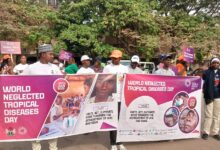‘Illegal Importation Of Medical Syringes May Kill Local Pharmaceutical Industries’

The National Agency for Food and Drug Administration and Control (NAFDAC) has admonished members of the Association of Nigerian Licensed Customs Agents (ANLCA) to think more of the interest of the country over and above personal gains in their activities as clearing agents at the nation’s ports.
Resident Media Consultant of the agency, Sayo Akintola disclosed this in a statement issued on Sunday, January 28, 2023.
According to him, the Director General of NAFDAC, Prof. Mojisola Adeyeye gave the advice in Lagos on Thursday during a familiarisation visit by the newly inaugurated executives of the Association of Nigerian Licensed Customs Agents (ANLCA), led by its National President, Mr. Emenike Nwokochi, to the NAFDAC Lagos corporate office.
Prof. Adeyeye narrated how she marveled at the stupendous investments committed to local production of Syringes in Nigeria by a local pharmaceutical company during a recent facility tour.
She said that the standard of the facilities she met on ground was comparable to whatever facility that could be found in the US or any country in Europe, adding that after the facility tour and being led into the warehouse, she was highly disturbed at the sight of huge unsold products.
The NAFDAC DG told her guests that over 1.5 billion units of the product were lying untouched in the warehouse due to low sales, exacerbated by the influx of imported syringes into the country, despite the high import duty slammed on the product to protect the local market.
Prof. Adeyeye however, noted with regret that intelligence reports reaching her indicated that some compromises were being made at the port of entry in allowing the illegal importation of unregistered containers of syringes into the country.
The NAFDAC DG expressed empathy towards manufacturers stating, “I understand the challenges of not making sales, especially after investing a significant amount of money. That’s why I am particularly meticulous when it comes to overseeing our export processes.”
As licensed customs agents, she emphasised their pivotal role in facilitating the legal and safe import and export of goods, ensuring compliance with required standards. She welcomed the familiarisation visit, highlighting its objective to establish effective collaboration and cooperation.
She also noted that the visit and discussion were important, considering the volume of food and agricultural commodities from Nigeria that were currently facing challenges at entry points in some countries in Europe, the United States of America, and the United Kingdom, where they had been repeatedly rejected.
Prof. Adeyeye lamented that, “Nigeria has lost billions of naira in trade that could have benefitted our people. About 70 per cent of our exports are rejected, food products especially. All these rejected products did not go through NAFDAC regulatory assessment. It disgraces us as a country”.
She said further, that it has also become a great issue of concern the number of substandard products coming into the country. “That’s why I attach significant importance to this association because the goods that are either imported or exported, often play a crucial role in determining the strength of our economy”
As licensed customs agents, Prof. Adeyeye said they were responsible for ensuring their members knew the importance of the assessment of accompanying shipping documents and that goods are cleared through customs and all necessary regulations, stressing that by following the rules and regulations that govern the import and export of goods, they were helping to protect society, the environment, and consumers.
Speaking in the same vein, the National President of ANLCA, Mr. Emenike Nwokochi stated, “as the Naira continues to fall to the dollar, we can’t do anything to help the Naira other than to increase the level of exports in the country to provide an alternative source of raising foreign exchange”. He further pledged his associations’ resolve to work in collaboration with the Agency to achieve the common goal of developing the nation’s economy.






